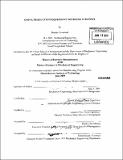| dc.contributor.advisor | Daniel Whitney and Charles Fine. | en_US |
| dc.contributor.author | Chouinard, Natalie, 1979- | en_US |
| dc.contributor.other | Leaders for Manufacturing Program. | en_US |
| dc.coverage.spatial | a-cc--- | en_US |
| dc.date.accessioned | 2010-02-09T16:58:32Z | |
| dc.date.available | 2010-02-09T16:58:32Z | |
| dc.date.copyright | 2009 | en_US |
| dc.date.issued | 2009 | en_US |
| dc.identifier.uri | http://hdl.handle.net/1721.1/51664 | |
| dc.description | Thesis (S.M.)--Massachusetts Institute of Technology, Dept. of Mechanical Engineering; and, (M.B.A.)--Massachusetts Institute of Technology, Sloan School of Management; in conjunction with the Leaders for Manufacturing Program at MIT, 2009. | en_US |
| dc.description | Includes bibliographical references (p. 61-62). | en_US |
| dc.description.abstract | This thesis recommends a China business and equipment strategy for the Controls Conveyor Robotics Welding (CCRW) group at General Motors. The current strategy is to use globally common equipment through predetermined global suppliers. The GM facilities in China, which are jointly owned with non-GM entities, believe that a local sourcing strategy would reduce lead times, transportation costs and increase the level of nearby service and support. These factors are catalyst for GM to reevaluate the current global common strategy. This thesis will provide an overview of the CCRW organization and discuss how the sourcing strategy has evolved through globalization. Due to the large variety of production tooling, this thesis will narrow the focus to two case studies: the first being a Main Control Panel (MCP) and the second being a weld controller. These case studies are used as a method to determine the pros and cons of the current sourcing strategy, where the MCP is a highly integrated design maintained by CCRW HQ and the weld controller is a "blackbox" which CCRW defines the functional specifications and procures "off the shelf' from a predetermined global supplier. Through local China visits, literature review and preliminary cost assessments, it was determined that while local sourcing may be a viable option for both the MCP and weld controller, there is not enough determinate information to commit to a sourcing change in the case of the Main Control Panel. From onsite visits to potential MCP option suppliers in China, it appears that likely "local" arrangements exists, however, further company analysis and validation will need to be conducted to adopt the change. | en_US |
| dc.description.abstract | (cont.) As for the weld controller, the local product variation with the current global supplier (based locally) is recommended and was validated by CCRW weld engineers by the completion of this internship. I The term "Local" will be used throughout this thesis to refer to "China," meaning solutions that are derived from internal to China. | en_US |
| dc.description.statementofresponsibility | by Natalie Chouinard. | en_US |
| dc.format.extent | 64 p. | en_US |
| dc.language.iso | eng | en_US |
| dc.publisher | Massachusetts Institute of Technology | en_US |
| dc.rights | M.I.T. theses are protected by
copyright. They may be viewed from this source for any purpose, but
reproduction or distribution in any format is prohibited without written
permission. See provided URL for inquiries about permission. | en_US |
| dc.rights.uri | http://dspace.mit.edu/handle/1721.1/7582 | en_US |
| dc.subject | Mechanical Engineering. | en_US |
| dc.subject | Sloan School of Management. | en_US |
| dc.subject | Leaders for Manufacturing Program. | en_US |
| dc.title | China production equipment sourcing strategy | en_US |
| dc.type | Thesis | en_US |
| dc.description.degree | M.B.A. | en_US |
| dc.description.degree | S.M. | en_US |
| dc.contributor.department | Leaders for Manufacturing Program at MIT | en_US |
| dc.contributor.department | Massachusetts Institute of Technology. Department of Mechanical Engineering | |
| dc.contributor.department | Sloan School of Management | |
| dc.identifier.oclc | 502267228 | en_US |

